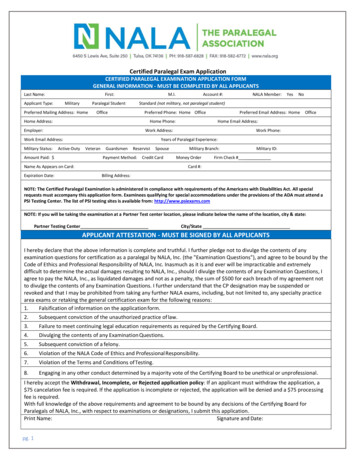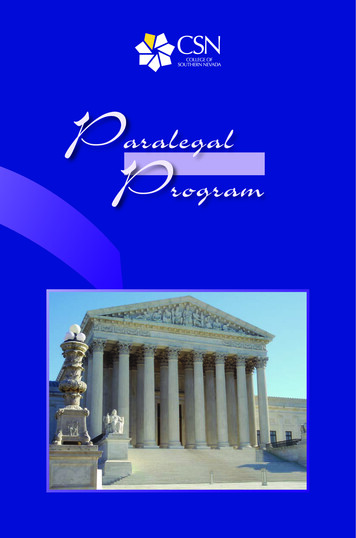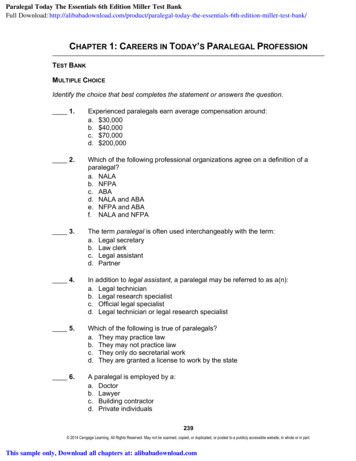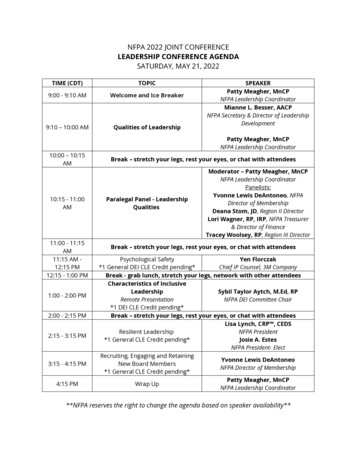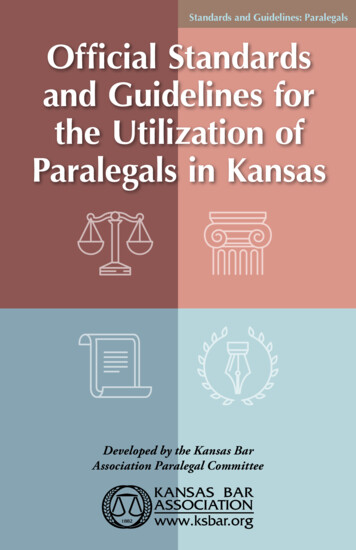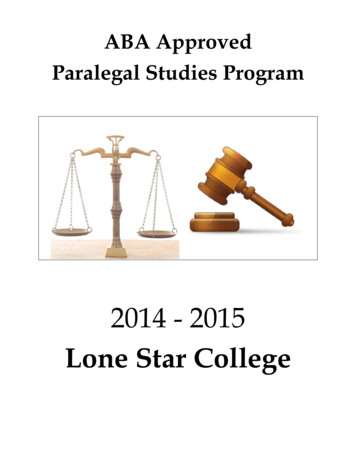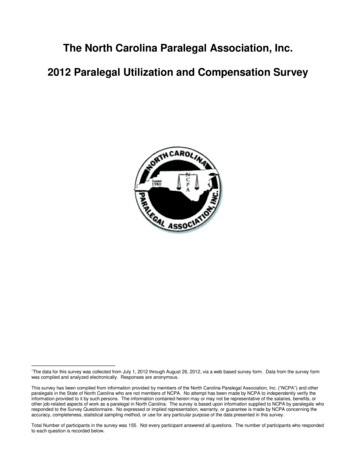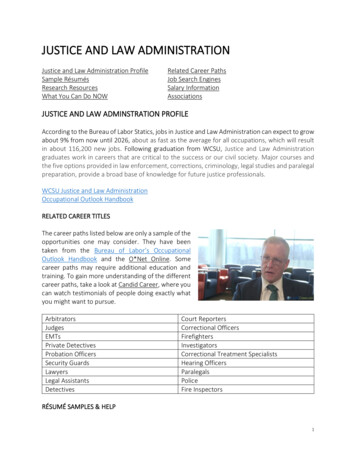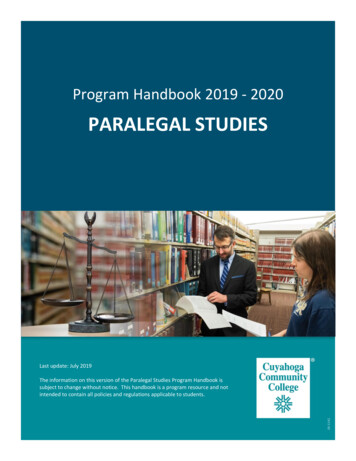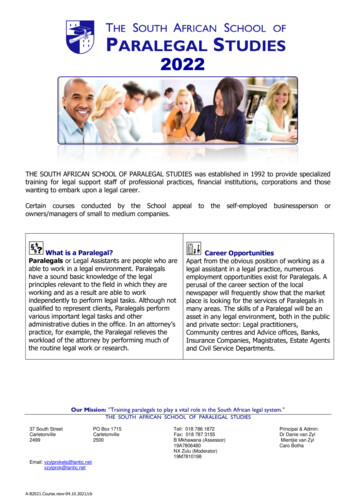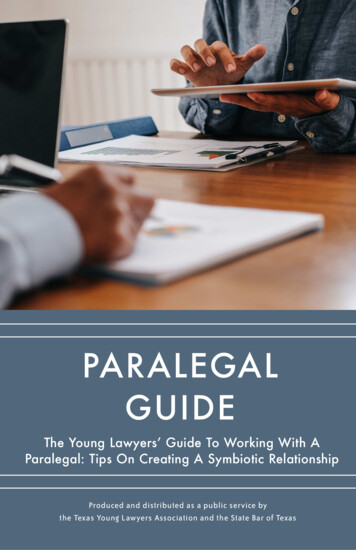
Transcription
PARALEGALGUIDEThe Young Lawyers’ Guide To Working With AParalegal: Tips On Creating A Symbiotic RelationshipProduced and distributed as a public service bythe Texas Young Lawyers Association and the State Bar of Texas
Prepared and distributed as a public service by the Texas Young Lawyers Association and theState Bar of Texas, 2021.This handbook is designed to help lawyers and paralegals form productive relationships. Allrights reserved. No part of these materials may be reproduced in any form or for any otherpurpose without the written consent of the Texas Young Lawyers Association.
TABLE OF CONTENTSI. INTRODUCTION. . . . . . . . . . . . . . . . . . . . . . . . . . . . . . . . . . 1II. GENERAL ADVICE FOR WORKINGWITH A PARALEGAL . . . . . . . . . . . . . . . . . . . . . . . . . . . . . . . 2III. WHAT CAN YOU EXPECTPARALEGALS TO DO? . . . . . . . . . . . . . . . . . . . . . . . . . . . . . . 3IV. WHAT SHOULD YOU NOT EXPECTPARALEGALS TO DO? . . . . . . . . . . . . . . . . . . . . . . . . . . . . . . 5V. WHAT CAN YOU DO TO HAVE THE OPTIMUMPARALEGAL-ATTORNEY RELATIONSHIP? . . . . . . . . . . . . 9VI. CONCLUSION . . . . . . . . . . . . . . . . . . . . . . . . . . . . . . . . . . . 10
I. INTRODUCTIONa.This Guide Is For YouThe Texas Young Lawyers Association and the Paralegal Division of the State Barof Texas have collaborated to guide young lawyers on working effectively with aparalegal. We hope that paralegals may also find this guide useful.b.AuthorityAs attorneys we like to know the authority supporting every opinion or statementwe read. Accordingly, you can rest assured that the opinions set forth in this guidecome from credible sources, including members of the Texas Young LawyersAssociation Board of Directors in consultation with the Paralegal Division of theState Bar of Texas.1 In addition, several citations are made to the State Bar ofTexas, the American Bar Association, and to the Texas Disciplinary Rules ofProfessional Conduct.1The State Bar of Texas was the first state bar in the U.S. to create a “division” for paralegals. See txpd.org.The State Bar defined “paralegal” and adopted Texas Paralegal Standards in 2006 as to the education,training, and work experience a paralegal should possess to be titled a “paralegal” See tion-and-standards/1
II. GENERAL ADVICE FOR WORKINGWITH A PARALEGALThe relationship between an attorney and a paralegal is crucial to say the least.The paralegal and attorney, as well as other assistants, form a team, and if theteammates don’t get along or work symbiotically, the team will never reach itsfull potential. Therefore, it is important that the team work together and respecteach other.In some firms, frequently in small or solo firms, one individual may performboth paralegal and assistant work in a “hybrid” role. In other environments, thereare distinct roles for paralegals, administrative assistants, and case clerks.a.R-E-S-P-E-C-TTexas Young Lawyer Association board members were asked what the mostimportant thing a young lawyer should keep in mind when working with aparalegal. The most common answer? You guessed it, respect.b.Communicate, Communicate, CommunicateOne of the criticisms paralegals have with attorneys is that they may notcommunicate well. However, this skill can be developed and it begins withinclusiveness between the attorney, paralegal, and overall team. All it takes is timeand effort.Start by setting up periodic meetings with the paralegal to go over the past,present, and future work. These meetings will give you an opportunity to delegatefuture tasks and review the work performed. Don’t forget to listen in thesemeetings as well, as a paralegal may have processes and efficiencies to offer.Limit “last minute” or “emergency” tasks as much as possible. We all know tasksor projects will come up that will require immediate action, but it’s not soundpractice to consistently operate at this level.2
Remember to copy (or bcc) the paralegal (and/or assistant) on emails so they stayinformed. Keeping your team informed lends to efficiencies and better clientservice. Paralegals and case assistants can also assist you in preserving andcommemorating your case/client file.c.Create a Team AtmosphereThe most productive attorney-paralegal relationships operate as a team. Involveparalegals in new cases from the beginning. Give the paralegal every bit ofinformation you can about the case so they may be as invested as you. Havingknowledge and information both helps the paralegal provide a better workproduct to the attorney, as well as saves the attorney time in explaining thebackground of a matter.To be a team, all members must feel part of one. As such, include paralegals incontinuing legal education lunches and professional activities.III.WHAT CAN YOU EXPECTPARALEGALS TO DO?The American Bar Association’s Standing Committee on Paralegals developedABA Model Guidelines for the Utilization of Paralegal Services.2 The State Bar ofTexas developed similar guidelines.A paralegal must operate under the supervision of the lawyer, and the attorney isprofessionally responsible for all work done for the client. This is particularlyimportant with today’s technology and electronic filings. An attorney maydelegate any tasks to a paralegal that the attorney may lawfully do, except for theitems listed in IV below.The Texas Paralegal Standards provide examples of the “Delegation of SubstantiveLegal Work” as including but not limited ministrative/paralegals/ls prlgs modelguidelines.pdf3
Conducting client interviews and maintaining general contact with the client; Locating and interviewing witnesses; Conducting investigations and statistical and documentary research;Drafting documents, correspondence, and pleadings;Summarizing depositions, interrogatories, and testimony; andAttending executions of wills, real estate closings, depositions, court oradministrative hearings, and trials with an attorney.“Substantive legal work” does not include clerical or administrative work.Accordingly, a court may refuse to provide recovery of paralegal time for suchnon-substantive work.3Additionally, below is a list of tasks that TYLA board members report theycommonly ask paralegals to complete: 3Pulling or printing casesCite checking casesWorking in document databasesDrafting routine pleadingsPreparing witness kitsPreparing and filing court filingsPreparing binders for attorneys (key documents/key pleadings/etc.)Doing background research on parties and witnessesPreparing legal spreadsheetsManaging the calendarDrafting and responding to routine discoveryDrafting shells of motions and other pleadingsCommunicating with clients and opposing counsel regarding routine issuesDrafting estate planning documentsDrafting corporate formation documentsGill Sav. Ass’n v. Int’l Supply Co., Inc., 759 S.W.2d 697, 705 (Tex. App. Dallas 1988, writ denied).4
IV.WHAT SHOULD YOU NOT EXPECTPARALEGALS TO DO?a.Texas Disciplinary Rules of Professional ConductBefore we address what paralegals should not be expected to do, it is importantto understand a lawyer’s obligations under the Texas Disciplinary Rules ofProfessional Conduct as they relate to working with paralegals.i. Rule 5.03: Responsibilities Regarding Nonlawyer Assistants.With respect to a nonlawyer employed or retained by or associated witha lawyer:(a) a lawyer having direct supervisory authority over the nonlawyer shallmake reasonable efforts to ensure that the person’s conduct is compatiblewith the professional obligations of the lawyer; and(b) a lawyer shall be subject to discipline for the conduct of such person thatwould be in violation these rules if engaged in by a lawyer if:(1) the lawyer orders, encourages, or permits the conduct involved; or(2) the lawyer:(i) is partner in the law firm in which the person is employed,retained by, or associated with; or is the general counsel of agovernment agency’s legal department in which the person isemployed, retained by or associated with; or has direct supervisoryauthority over such person; and(ii) with knowledge of such misconduct by the nonlawyerknowingly fails to take reasonable remedial action to avoid ormitigate the consequences of that person’s misconduct.This means that under these rules, a lawyer should give paralegalsappropriate instruction and supervision regarding the ethical aspects of theiremployment. This includes, but is not limited to, maintainingconfidentiality, preventing conflicts of interest, ensuring honest billing and5
time tracking, avoiding fee splitting, avoiding conversations with jurors untilthe trial is over, avoiding ex parte communication with judges, dealing withopposing counsel in a professional manner, and maintaining high standardsof professionalism at all times.You should ensure that paralegals working for you or your firm are aware ofthe Texas Disciplinary Rules of Professional Conduct. A lawyer is responsiblefor a paralegal’s work product, so consider the level of education, training,and experience of the paralegal when assessing how much supervision isneeded.ii.Rule 5.05: Unauthorized Practice of Law.A lawyer shall not:(a) Practice law in a jurisdiction where doing so violates the legal professionin that jurisdiction; or(b) assist a person who is not a member of the bar in the performance ofactivity that constitutes the unauthorized practice of law.Rule 5.05(b) does not mean that the use of paralegals is prohibited but ratherthat you must supervise the delegated work; retain responsibility for thework, as this responsibility may never be delegated; and maintain a directrelationship with the client. It is your responsibility to ensure that a paralegalworking for you or your firm does not engage in the unauthorized practiceof law.iii. Rule 1.01. Competent and Diligent RepresentationIn 2019, Rule 1.01 of the Texas Disciplinary Rules of Professional Conductwas amended to include technology competency. This is an area whereattorneys and paralegals can work together to ensure compliance.Maintaining Competence8. Because of the vital role of lawyers in the legal process, each lawyer shouldstrive to become and remain proficient and competent in the practice of law,including the benefits and risks associated with relevant technology. To6
maintain the requisite knowledge and skill of a competent practitioner, alawyer should engage in continuing study and education. If a system of peerreview has been established, the lawyer should consider making use of it inappropriate circumstances. Isolated instances of faulty conduct or decisionshould be identified for purposes of additional study or instruction.b.What cannot be delegated to a paralegal 4i.Responsibility for establishing an attorney-client relationship.ii. Responsibility for establishing the amount of fee to be charged for alegal service.iii. Responsibility for a legal opinion rendered to a client. A paralegal maycommunicate legal advice from an attorney, but they cannot expand uponthis advice. In determining whether a paralegal is giving legal advice, theparalegal should ask three questions before answering: (1) Does the answerrequire the paralegal to utilize legal knowledge or judgment? (2) Does theanswer concern the client’s legal rights or responsibilities? (3) Will the clienttake some action because of the answer? If the answer is yes to any of thesequestions, the paralegal cannot answer the question, even if they know theanswer. It is important to advise a paralegal regarding these questions andto inform them regarding what is considered giving legal advice.iv. Responsibility for work product. Since the responsibility for workproduct cannot be delegated, ultimately all the work product rests with youand all documents should be carefully reviewed before they are circulated.v. Responsibility to maintain a direct attorney-client relationship. Aparalegal’s accountability is to you, not to the client. Paralegals may beutilized in communicating with the client, but it is not their responsibilityto maintain the relationship. When communicating with clients the paralegalshould make the client aware of their job title and that they cannot answer4See Paralegal Ethics Handbook, k7
legal questions. A paralegal can serve as a good asset in clientcommunications, and may communicate information from the attorney, butshould not be put in a position to explain processes or matters that couldborder on giving legal advice and would be better explained by the attorney.Additionally, while a paralegal may obtain initial information from apotential client, the attorney should hold the initial client meeting, not theparalegal. It is helpful to have the paralegal involved in the initial clientmeeting (e.g to take notes and follow up on items needed) but they shouldnot be the only one meeting with the client.vi. The signing of legal pleadings. Paralegals may not sign pleadings. An“/s/” signature on a pleading indicates the attorney has read the pleading (ormotion), pursuant to Texas Rules of Civil Procedure 13. An email from theattorney to the paralegal (or assistant) with the document to be filed is agood way for the attorney to direct the application of his or her electronicsignature to a document to be filed. Some attorneys also keep a physicallysigned copy in their files.vii. The negotiation of settlement agreements.viii. Solicitation of legal business.ix. Advertising or contracting with members of the public for theperformance of legal services.x. Representing a client in court. Although in certain instances a paralegalmay appear before a court or agency on administrative matters, they maynot represent a client.8
V.WHAT CAN YOU DO TO HAVE THEOPTIMUM PARALEGAL-ATTORNEYRELATIONSHIP?Paralegals can be your greatest allies. Often a paralegal has been at the job muchlonger than you have been a lawyer, and the advice they offer can be invaluable.The paralegals the TYLA Board interviewed gave the following advice:a.Have patience. It is important that you consider the tasks assigned to theparalegal.b.Be consistent. Do not continuously change the instructions on a task. Besure to give clear instructions and stick with those instructions. As one TYLAmember states: “Bad work product is often the result of bad instructions.”c.Be organized. Nothing can frustrate a paralegal more than waiting until thelast minute to request a task. Rushing an assignment increases the chancethat mistakes will be made. However, being organized does not mean thatyou must micromanage a paralegal’s work.d.Make your expectations clear. It is important from the beginning ofworking with a paralegal that you set forth your expectations. Be clear as towhat you expect regarding the work product and be open to the paralegalasking clarifying questions. Paralegals find it very helpful when attorneysinclude what end result they want to achieve, as sometimes the paralegalmay have a more efficient way to provide what the attorney needs.e.Communicate. A successful practice involves excellent communication—communication not only with your clients but your staff as well. For thesmooth flow of work, make sure your inform legal staff of important workneeded and the timeline by which it must be completed.9
f.VI.Have respect. Respecting a paralegal’s advice is important. As one paralegaladvised: “If a paralegal questions a course of action, it’s not a challenge toauthority. We’re thinking of a horror story in a past case or knowing exactlywhat a partner or older associate wants. In the latter case, the young associatewill take a directive from a partner as set in stone when the partner is actuallygiving a broad description of what he or she wants done and the mechanicsare malleable. But the young associate is wary of deviating from what he orshe thinks the partner wants. Often a paralegal knows exactly what thepartner wants because the paralegal has done it for the partner in the pastand can explain it better than the partner explained it to the associate.”CONCLUSIONA paralegal can be invaluable to your practice. Learning how to effectively workas part of a team is an art, not a science. We hope this guide helps you whenforming new paralegal-attorney relationships and improving existing ones.10
Prepared as a public ser vice by theTexas Young Lawyers Associationand distributed by the State Bar of Texas.This pamphlet and other free resourcesfor attorneys can be found online at tyla.org.For additional copies please Contact:Texas Young Lawyers AssociationP.O. Box 12487 Austin, Texas 78711-2487(800) 204-2222, Ext. 1529tyla.orgSB0211E44599 11/21
legal service. iii. Responsibility for a legal opinion rendered to a client. A paralegal may communicate legal advice from an attorney, but they cannot expand upon this advice. In determining whether a paralegal is giving legal advice, the paralegal should ask three questions before answering: (1) Does the answer
